National Health Care Act of 1958
The National Health Care Act of 1958 (国民健康保険法, kokuminkenkouhokenhou)' is a Japanese act that governs the National Health Insurance system operated by Japanese municipalities for residents who are not enrolled in Employees Health Insurance. It was passed by the Diet of Japan on December 27, 1958.[1]
 |
|---|
| This article is part of a series on the politics and government of Japan |
|
|
|
|
Details
- According to Article 5 of the Act, registered residents of a municipality should be enrolled in National Health Insurance. (NHI)
- According to Article 9, people must register for NHI.
- According to Article 127 the Act allows municipalities to set up a fine of up to 100,000 yen for people who do not comply with the Act.
gollark: Except vague general ones.
gollark: Any predictions about stuff "tens of thousands of years" in the future seem to me like they'll be wildly inaccurate.
gollark: Biotechnology is improving.
gollark: Not necessarily!
gollark: So, if things are bad, delude yourself into thinking it's fine?
References
- e-Gov.go.jp 国民健康保険法 Retrieved on September 1, 2012 (in Japanese)
External links
This article is issued from Wikipedia. The text is licensed under Creative Commons - Attribution - Sharealike. Additional terms may apply for the media files.